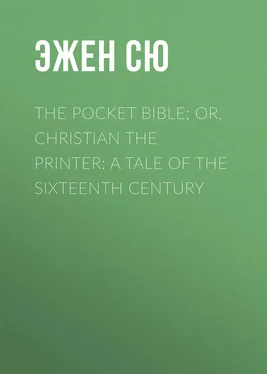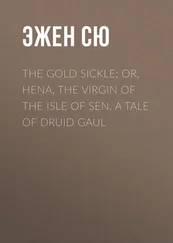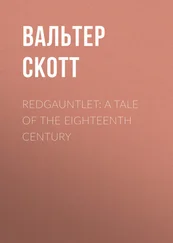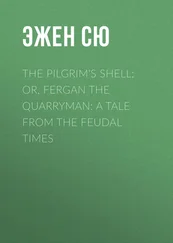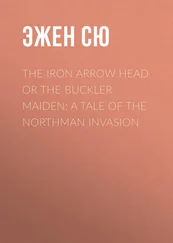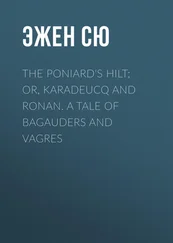Эжен Сю - The Pocket Bible; or, Christian the Printer - A Tale of the Sixteenth Century
Здесь есть возможность читать онлайн «Эжен Сю - The Pocket Bible; or, Christian the Printer - A Tale of the Sixteenth Century» — ознакомительный отрывок электронной книги совершенно бесплатно, а после прочтения отрывка купить полную версию. В некоторых случаях можно слушать аудио, скачать через торрент в формате fb2 и присутствует краткое содержание. Жанр: literature_19, foreign_antique, foreign_prose, на английском языке. Описание произведения, (предисловие) а так же отзывы посетителей доступны на портале библиотеки ЛибКат.
- Название:The Pocket Bible; or, Christian the Printer: A Tale of the Sixteenth Century
- Автор:
- Жанр:
- Год:неизвестен
- ISBN:нет данных
- Рейтинг книги:3 / 5. Голосов: 1
-
Избранное:Добавить в избранное
- Отзывы:
-
Ваша оценка:
- 60
- 1
- 2
- 3
- 4
- 5
The Pocket Bible; or, Christian the Printer: A Tale of the Sixteenth Century: краткое содержание, описание и аннотация
Предлагаем к чтению аннотацию, описание, краткое содержание или предисловие (зависит от того, что написал сам автор книги «The Pocket Bible; or, Christian the Printer: A Tale of the Sixteenth Century»). Если вы не нашли необходимую информацию о книге — напишите в комментариях, мы постараемся отыскать её.
The Pocket Bible; or, Christian the Printer: A Tale of the Sixteenth Century — читать онлайн ознакомительный отрывок
Ниже представлен текст книги, разбитый по страницам. Система сохранения места последней прочитанной страницы, позволяет с удобством читать онлайн бесплатно книгу «The Pocket Bible; or, Christian the Printer: A Tale of the Sixteenth Century», без необходимости каждый раз заново искать на чём Вы остановились. Поставьте закладку, и сможете в любой момент перейти на страницу, на которой закончили чтение.
Интервал:
Закладка:
"And if he confesses, let everything be pardoned," replied the indulgent mother. "He must have succumbed to an impulse of fanatical charity."
With the lamp in his hand the artisan descended into the kitchen with his wife without seeking to conceal their approach. The sound of their steps and the creak of the wooden staircase under their feet finally attracted Hervé's attention. He suddenly turned his head, and, seeing his father and mother, rose from the floor with a start as if propelled by a spring. In his surprise the lad dropped his instrument of torture.
Christian's son was almost eighteen years of age. His once open, happy and blooming face, that breathed frankness, had become pale and somber; his unsteady, restless eyes seemed to eschew observation. The unexpected presence of his parents seemed at first to cause him a painful impression; he looked embarrassed; but doubtlessly calling himself to account for the unguarded impulse of false shame, he said resolutely without raising his eyes:
"I was administering a discipline to myself – I thought I was alone – I was fulfilling a penance – "
"My son," replied the artisan, "seeing that you are up, sit down upon that chair – your mother and I have serious matters to speak about with you; we shall be better here than upstairs, where our voice might wake up your sister."
Not a little astonished, the lad sat down, on a stool. Christian also sat down; Bridget remained standing near her husband, leaning upon his shoulder, with her eyes resting compassionately upon her son.
"My boy," said Christian, "I wish, first of all, to assure you that neither I nor your mother have ever thought of crossing you in the religious practices that you have of late been indulging in with all the impetuous ardor of a neophyte. But seeing that the occasion presents itself, I wish to make some observations to you upon the subject in all fatherly love."
"I listen, father; speak."
"You, as well as your sister and brother, have been brought up by us in the evangelical doctrine – love one another, do not unto others what you would not like to be done to, pardon those who trespass against you, pity the sinners, help the sorrowful, honor those who repent, be industrious and honest. These few words sum up the eternal morality that your mother and myself have preached and held up to you since your infancy as the example to be followed. When you reached riper years of intelligence I sought to inculcate in your mind that belief of our fathers that we are immortal, body and soul, and that after what is called death, a moment of transition between the existence that ends and that which begins, we are born again, or, rather, continue to live, spirit and matter, in other spheres, thus rising successively, at each of those stages of our eternal existence, towards infinite perfection equal to that of the Creator."
"That, father, is heresy, and flies in the face of Catholic dogma."
"Be it so. I do not force the belief upon you. Every man is free to strive in his religious aspirations after his own ideal of the relations between the Creator and the creature. The freedom to do so is the most priceless attribute of the soul, the sublimest right of human conscience."
"There is no religion in the world beside the Catholic religion, the revealed religion," put in Hervé in a sharp voice. "All other belief is false – "
"My friend," said Christian interrupting his son, "I do not wish to enter into a theological discussion with you. You have of late lost your former happy disposition, you seem to mistrust us, you grow more and more reserved and taciturn, your absences from the printing shop are becoming frequent and are prolonged beyond all measure; your nature, once so pleasant and buoyant, has become irritable and sour, even to the point of rudeness towards your brother Odelin before his departure for Milan. Besides that and since, your asperity towards your sister is ever more marked – and yet you know that she loves you dearly."
At these last words a thrill ran over Hervé's frame. At the mention of his sister, his physiognomy grew more intensely somber and assumed an undefinable expression. For a moment he remained silent, whereupon his voice, that sounded sharp and positive shortly before in his answers regarding religious matters, became unsteady as he stammered:
"At times I am subject to fits of bad humor that I pray God to free me of. If – I have been – rude – to my sister – it is without meaning to. I entertain a strong affection for her."
"We are certain of that, my child," Bridget replied; "your father only mentions the circumstance as one of the symptoms of the change that we notice in you, and that so much alarms us."
"In short," Christian proceeded, "we regret to see you give up the company of the friends of your childhood, and no longer share the innocent pleasures that become your age."
Hervé's voice, that seemed so much out of his control when his sister Hena was the topic, became again harsh and firm:
"The friends whom I formerly visited are worldly, they are running to perdition; the thoughts that to-day engage me are not theirs."
"You are free to choose your connections, my friend, provided they be honorable. I see you have become an intimate friend of Fra Girard, the Franciscan monk – "
"God sent him across my path – he is a saint! His place is marked in paradise."
"I shall not dispute the sanctity of Fra Girard; he is said to be a man of probity, and I believe it. I must admit, however, that I would have preferred to see you form some other friendship; the monk is several years your senior; you seem to have a blind faith in him; I fear lest the fervor of his zeal may render you intolerant, and lead you to share his own excessive religious exaltation. For all that, I never reproached you for your intimacy with Fra Girard – "
"Despite anything that you could have done or said, father, I would have seen to my own salvation. God before the family."
"And do you imagine, my son, that we could be opposed to your welfare?" asked Bridget in an accent of affectionate reproach. "Do you not know how much we love you? Are not all our thoughts dictated by our attachment to you? Can you doubt our affection?"
"Happiness lies in the faith, and the faith comes to us from heaven. There is no welfare outside of the bosom of the Church."
"It would have become you better to answer your mother's kind words with other terms," observed Christian, as he saw his wife hurt and saddened by the harshness of Hervé's words. "If your faith comes from heaven, filial love also is a celestial sentiment; may God forfend that it be weakened in your heart – in fine, may God forfend that Fra Girard's influence over you should tend to pervert, despite himself and despite yourself, your sense of right and wrong."
"I do not understand you, father."
The artisan cast a significant look at Bridget, who, guessing her husband's secret thoughts, felt assailed by mortal anguish.
"I shall explain myself more clearly," Christian continued. "Do you remember a few days ago at the shop when some of our fellow workmen expressed indignation at the traffic in indulgences?"
"Yes, father; and I withered the blasphemous utterances with the contempt that they deserved. Indulgences open the gates of heaven."
"One of our fellow workingmen loudly likened the commerce in indulgences to a theft," Christian proceeded, unable completely to overcome his emotion, while Bridget in vain sought to catch the eyes of her son, who, from the start of this conversation held his eyes nailed to the floor. "Upon hearing so severe an opinion expressed upon the indulgences," Christian added, "you, my son, shouted that all money, even if it proceeded from theft, became holy if devoted to pious works; you said so, did you not? You thereby justified a reprehensible action."
Читать дальшеИнтервал:
Закладка:
Похожие книги на «The Pocket Bible; or, Christian the Printer: A Tale of the Sixteenth Century»
Представляем Вашему вниманию похожие книги на «The Pocket Bible; or, Christian the Printer: A Tale of the Sixteenth Century» списком для выбора. Мы отобрали схожую по названию и смыслу литературу в надежде предоставить читателям больше вариантов отыскать новые, интересные, ещё непрочитанные произведения.
Обсуждение, отзывы о книге «The Pocket Bible; or, Christian the Printer: A Tale of the Sixteenth Century» и просто собственные мнения читателей. Оставьте ваши комментарии, напишите, что Вы думаете о произведении, его смысле или главных героях. Укажите что конкретно понравилось, а что нет, и почему Вы так считаете.
